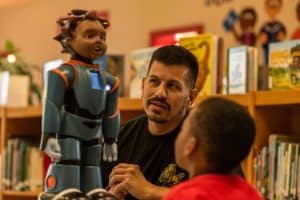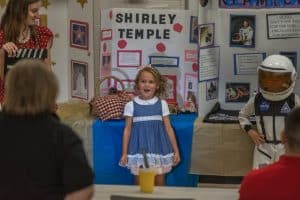
Methodist University’s Education Department is finding inventive ways to teach their students while productively giving back to the community.
Methodist University’s Education Department is finding inventive ways to teach their students while productively giving back to the community.
On top of their studies in the classroom this semester, the department is hosting weekly tutoring sessions at schools across Fayetteville along with an educational event geared towards home-schooled students.
“We find various opportunities to help our teacher candidates [students majoring in Teacher Education] merge theory and research with practice by providing real-world experiences,” said Dr. Jessica Redcay, MU’s chair of Teacher Education. “The best part is these real-world experiences go onto benefit the community in various ways.”
At Lucile Souders Elementary School (in school) and Margaret Willis Elementary School (after school), the University’s teacher candidates provide separate weekly one-on-one tutoring sessions to first-grade students at the schools. Using a program called Ludus Reading, which was developed by Redcay, the teacher candidates utilize play-based and multi-sensory strategies to improve the students’ reading skills.
 Technology is also a vital part of the department’s teaching curriculum. During the tutoring sessions, the teacher candidates can operate Robokind humanoid robots as their own personal teaching assistants—helping students learn how to verbalize consonants and vowels. As a bonus, the teacher candidates can prompt the robots to talk, dance and even offer virtual prizes as the students learn.
Technology is also a vital part of the department’s teaching curriculum. During the tutoring sessions, the teacher candidates can operate Robokind humanoid robots as their own personal teaching assistants—helping students learn how to verbalize consonants and vowels. As a bonus, the teacher candidates can prompt the robots to talk, dance and even offer virtual prizes as the students learn.
“One of the teachers at the school reported that after only three of our tutoring sessions, the word fluency scores of her first-grade students doubled,” Redcay said.
Roland Benavidez, a junior majoring in Elementary Education (K-6), mentioned his educational experience at Methodist University allows him to take what he has learned in the classroom and immediately apply it to a real-life scenario at the elementary schools.
“The tutoring sessions are a priceless experience that allows us to utilize the research-based learning strategies we’re taught at Methodist University. We’re learning how to become more effective and efficient educators that help students reach their fullest potential,” said Benavidez. “The passion and enthusiasm the Education Department’s faculty and staff bring to the classroom certainly motivate me to become an even better leader for students.”
The efforts of MU’s Education Department are not limited to public school students. In fact, the department—along with the University’s honor society for education, Kappa Delta Pi, and the Student North Carolina Association of Educators— hosted a special event for home-schooled students on Nov. 5.
 The first-ever Wax Museum event encouraged home-schooled students across Fayetteville to dress up and present a report about an important historical figure. The University provided each student with a self-guided website that taught them the process of researching a topic. Then, during the event, teacher candidates graded the students’ projects and provided beneficial feedback.
The first-ever Wax Museum event encouraged home-schooled students across Fayetteville to dress up and present a report about an important historical figure. The University provided each student with a self-guided website that taught them the process of researching a topic. Then, during the event, teacher candidates graded the students’ projects and provided beneficial feedback.
“Our community partnership work is a win-win situation,” Redcay said. “Not only do we want to provide more opportunities for learning, but we want young students in the community to have the opportunity to attend Methodist University in the future.”
The Education Department looks forward to implementing more strategies this spring, including a Virtual Teaching Lab.
To apply to the University’s Education Department program, visit here.